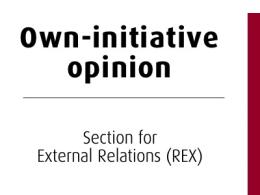European Economic
and Social Committee
ACP și Africa
De la prima Convenție de la Lomé (1975) la Acordul de la Cotonou (2000-2021), parteneriatele UE-ACP au reglementat relațiile dintre UE și 79 de țări din grupul statelor din Africa, zona Caraibelor și Pacific (ACP), care a devenit recent Organizația statelor din Africa, zona Caraibilor și Pacific (OACPS).
În această perioadă, CESE, împreună cu societatea civilă din ACP, a luptat pentru recunoașterea rolului esențial jucat de actorii nestatali în procesul de dezvoltare, până la realizarea acestuia prin Acordul de la Cotonou, care a mandatat CESE să organizeze activități și consultări cu „grupurile de interese economice și sociale ACP-UE”, pentru a colecta punctele de vedere ale societății civile organizate și a-i permite acesteia să se exprime. Scopul a fost acela de a încuraja schimburile și de a oferi recomandări cu privire la chestiuni și politici relevante pentru relațiile ACP-UE, adresate ulterior în mod oficial liderilor UE și ACP.
În practică, activitățile CESE privind relațiile UE-OACPS se desfășoară în principal sub îndrumarea unui comitet de monitorizare ACP-UE favorabil incluziunii, alcătuit din membri CESE și din delegați reprezentând grupurile de interese economice și sociale din țările ACP.
Comitetul de monitorizare ACP-UE menține contacte periodice cu reprezentanții societății civile din țările ACP la diferite niveluri, prin:
- ședințe periodice ale comitetului de monitorizare ACP-UE;
- seminare regionale în țările ACP, care oferă un forum pentru subiecte de discuție de interes comun cu reprezentanții societății civile, în regiuni diferite;
- reuniuni generale trienale ale grupurilor de interese economice și sociale ACP-UE, la Bruxelles.
De asemenea, CESE menține contacte periodice cu reprezentanții grupurilor de interese economice și sociale din Uniunea Africană, în contextul strategiei comune UE-Africa. În special, CESE organizează reuniuni anuale cu rețeaua UE-Africa a partenerilor economici și sociali.
Pe parcursul multor ani, CESE a avut contacte periodice cu Adunarea Parlamentară Paritară ACP-UE, prezentând rapoarte cu privire la activitățile sale în cadrul sesiunilor Adunării Plenare.
De asemenea, CESE are contacte strânse cu organizații internaționale ale angajatorilor, lucrătorilor, agricultorilor, cooperativelor și consumatorilor. Aceste organizații numesc reprezentanții ACP invitați la reuniunile organizate de CESE, inclusiv în Comitetul de monitorizare ACP-UE.
